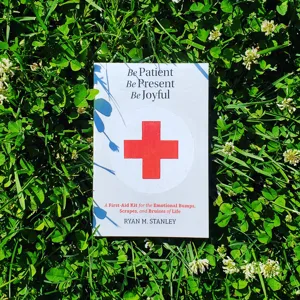Podcast Summary
Exploring Inner Strengths and Practices for Well-being: Focusing on kindness and compassion towards oneself and others (benevolence) can create inner resilience and improve overall well-being. Reflect on your own psychological strengths and share them with the community.
Key takeaway from this episode of Being Well is that each of us carries with us inner strengths and practices that are essential to our well-being. These psychological skills are not material possessions, but rather intangible resources that help us navigate life's challenges. Dr. Rick Hansen, a clinical psychologist and bestselling author, shared one such strength - benevolence. He emphasized the importance of kindness and compassion towards oneself and others in the face of adversity. By focusing on benevolence, we can create a sense of inner resilience and improve our overall well-being. The episode also encouraged listeners to reflect on their own psychological strengths and share them with the community. So, take a moment to consider what's in your "backpack" of inner resources. What practices or skills do you rely on when life gets tough? Share your thoughts with the Being Well community and join the conversation.
Cultivating a benevolent attitude: Benevolence is essential for fulfilling life, it's not about being perfect, but having a fundamental orientation towards constructing rather than destructing, extend it towards self through self-compassion, and treat others and self with kindness as per golden rule.
Having a benevolent attitude towards oneself and others is essential for living a fulfilling life. This attitude, which includes compassion, a willingness to see the good, and a basic positive regard for others, forms the foundation for our interactions with the world. It's not about being perfect or a saint, but rather having a fundamental orientation towards constructing rather than destructing. This benevolence can be thought of as a non-conditional, unconditional force that radiates outwards, influencing our relationships with others. It's important to recognize that not everyone moving through this field of benevolence is worthy of trust or partnership. However, our benevolence remains unconditional, and we can also extend it towards ourselves through practices like self-compassion. Ultimately, the golden rule applies to both our relationships with others and ourselves: treat others and ourselves as we would want to be treated.
The power of patience in personal growth: Patience is a key virtue in personal growth, allowing us to delay gratification and find satisfaction in the journey towards accomplishment.
The path to accomplishment and personal growth is often the result of many small steps taken over a long period of time. Patience is a key virtue in this process, as we must learn to delay gratification and find satisfaction in the meantime. This can be particularly challenging when we experience scarcity, whether it's in our external circumstances or internally. However, recognizing the opportunities for patience that we've had in our lives can help us cultivate this important skill. As the ancient story of Siddhartha illustrates, the ability to wait and think can be a powerful psychospiritual virtue.
Understanding Patience: External Factors and Psychological Needs: Acknowledge external circumstances and psychological needs before focusing on personal patience. Build up psychological strengths and cultivate curiosity to foster patience.
Patience is not just an individual trait, but it's deeply connected to the external circumstances and psychological needs of an individual. For some, the basic needs like food and safety are not met, making patience a luxury. For others, historical prejudice and injustice fuel a sense of urgency. Acknowledging these realities is crucial before focusing on cultivating patience within oneself. The speaker shares his personal experience of having psychological cravings that made it hard to be patient. He emphasizes the importance of building up psychological strengths, such as a sense of enoughness and relaxation, to foster patience. The speaker also introduces the concept of curiosity as a second important quality, encouraging the desire to understand truths about oneself and the world around us.
Exploring the Value of Curiosity: Curiosity leads to deeper self-understanding, challenges assumptions, reduces stress, and simplifies aspects of life.
Curiosity, a fundamental aspect of growth and learning, involves questioning our beliefs and experiences, investigating the nature of reality, and being open to new perspectives. This curiosity is not only valuable in our daily lives but also plays a significant role in practices like Buddhism, which emphasizes the importance of introspection and inquiry. Moreover, being curious and open-minded can help us challenge our assumptions and reduce stress, as demonstrated by the Zen saying, "Maybe so." This curiosity can lead us to deeper understandings of ourselves and the world around us, revealing the interconnected and changing nature of all experiences. Additionally, embracing the notion of "not knowing" can help us simplify aspects of our lives, such as our skincare routine, and focus on effective, scientifically-backed solutions.
Explore science-based resources for health and life challenges: Listen to the ZOE Science and Nutrition podcast for food and health insights and the Doctor John DeLaney show for practical advice. Develop self-regulation skills for improved relationships and overall well-being.
There are valuable resources available to help individuals make informed health choices and navigate personal challenges. The ZOE Science and Nutrition podcast, led by world-class scientists, offers science-based insights into food and health. Meanwhile, the Doctor John DeLaney show provides practical advice for dealing with various life situations, offering a complementary perspective to the Being Well podcast. Additionally, self-regulation, the ability to manage impulses and respond thoughtfully, is a crucial skill for effective interpersonal relationships. This skill, demonstrated in research like the marshmallow test, is essential for managing social and emotional impulses. By accessing these resources and developing self-regulation, individuals can enhance their overall well-being.
Impulse control and happiness: Understanding impulse control and its impact on happiness, health, and success is crucial. Environment, temperament, and upbringing influence this ability. Balance is key.
The ability to regulate impulses and delay gratification, as studied in the marshmallow experiment, is a crucial factor in overall happiness, health, and success. This capacity is influenced by a combination of environment, personal temperament, and upbringing. While some people naturally struggle with impulse control, they may also possess other valuable gifts. Conversely, being overly self-controlled can limit exploration and expression of joy. Understanding the importance of self-regulation and knowing when to let go can lead to a more balanced and fulfilling life.
Exploring the Strengths of Self-Regulation, Benevolence, Curiosity, and Grit: Embrace self-regulation for managing emotions and behaviors, but don't forget to be open to new experiences. Cultivate benevolence and curiosity to connect with others and explore the world. Trust in your gritty core for resilience and self-reliance.
We all have the capacity for self-regulation, benevolence, and curiosity, as well as an indestructible core of grit within us. Self-regulation is important for managing emotions and behaviors, but it's also essential to find a balance between regulation and openness to experience. Benevolence and curiosity help us connect with others and explore the world around us. Grit is the unyielding core inside us that keeps us going even in the face of adversity. These strengths can be cultivated and chosen where to apply them in our lives. Trusting ourselves and knowing our limits is crucial, especially for those who lean more towards regulation. Reality is the ultimate altar, and embracing it is essential for resilience and self-reliance. By tapping into our gritty core, we can find the resources to help us navigate life's challenges and find answers to our inquiries.
Find inner strength and resilience: Even in tough times, find compassion within, tap into inner temple for clarity, and remember past triumphs to fuel resilience.
Even when life gets tough and we feel exhausted, it's essential to find our inner strength and resilience. This can be done by being compassionate with ourselves, recognizing that our feelings of exhaustion and defeat are natural, and tuning into our innermost temple or refuge within ourselves. In this inner sanctuary, we can find our clear seeing and intending, which will help us tap into our grit and persevere. It's important to remember that everyone is on their own side, and we need to cultivate this inner strength for ourselves, just as we offer it to others. Even those who have faced significant challenges can find this inner refuge, and it's a humbling reminder of our own potential. Additionally, reflecting on our past triumphs and appreciating our own strengths can help us tap into this inner resilience when we need it most.
Five Essential Traits for Personal Growth: Benevolence, patience, curiosity, self-regulation, and grit are vital for personal growth and living a fulfilling life. They help build positive relationships, achieve long-term goals, and maintain self-compassion.
The abilities to show benevolence, practice patience, cultivate curiosity, exercise self-regulation, and possess grit are essential for personal growth and navigating life's challenges. These traits help us build positive relationships, achieve long-term goals, and maintain self-compassion. Benevolence involves extending kindness to others and ourselves, patience requires diligence and waiting, curiosity involves identifying truths and being genuinely interested in others and the world, self-regulation is the ability to control impulses and prioritize, and grit is the unyielding determination to persevere despite adversity. By focusing on these traits, we can enhance our well-being and live more fulfilling lives.
The importance of grit and commitment to personal growth: Grit and commitment to personal growth are essential for living a fulfilling life. Understanding our own well-being and making agency choices can help us develop inner strengths and thrive in the long run.
Having grit and commitment to personal growth are essential for living a fulfilling life. As discussed on the podcast, agency, or the commitment to doing what we can and understanding our own well-being, is crucial. Without grit, it's challenging to get on our own side and develop the inner strengths that help us thrive in the long run. We encourage listeners to share the things they can't live without by emailing contact@beingwellpodcast.com or following us on social media. If you've enjoyed the podcast, please subscribe, leave a rating, and review on your preferred platform. Support the show on Patreon for bonus content and ad-free listening, or simply tell a friend about it to help us reach more people. Thanks for tuning in, and we'll talk to you soon.





